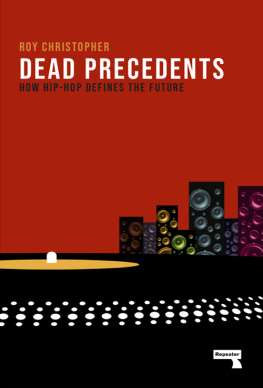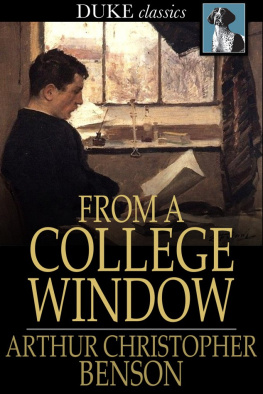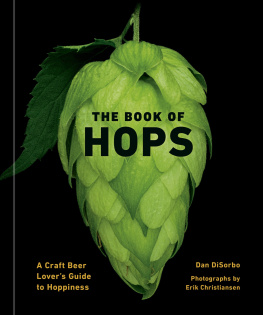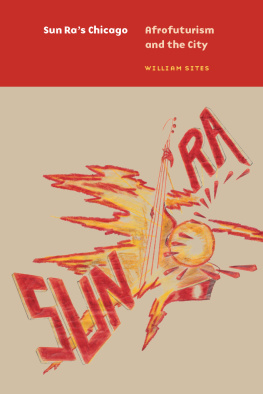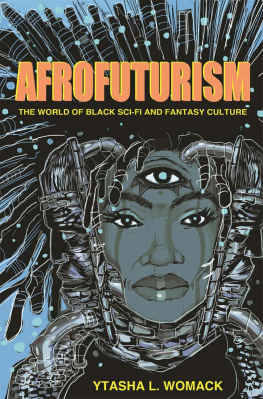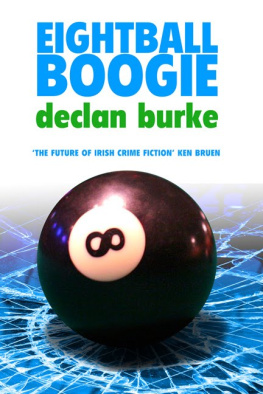Boogie Down Predictions



Boogie Down Predictions
Hip-Hop, Time, and Afrofuturism
Edited by Roy Christopher
ISBN: 9781913689285
Introduction Copyright Ytasha L. Womack
First Published by Strange Attractor Press 2022
Texts Copyright 2022 The Authors
Cover image by Savage Pencil
Layout by Dominic Rafferty
www.dgrafferty.com
Roy Christopher has asserted his moral right to be identified as the editor of this collection in accordance with the Copyright, Designs and Patents Act, 1988. All rights reserved. No part of this publication may be reproduced in any form or by any means without the written permission of the publishers. Every effort has been made to trace or contact all copyright holders. The publishers will be pleased to make good any omissions or rectify any mistakes brought to their attention at the earliest opportunity.
A CIP catalogue record for this book is available from the British Library.

Strange Attractor Press
BM SAP, London, WC1N 3XX, UK
www.strangeattractor.co.uk
Distributed by The MIT Press, Cambridge, Massachusetts.
And London, England.
d_r0
Contents
Roy Christopher
Ytasha L. Womack
Steven Shaviro
Tiffany Barber
Jeff Heinzl
Nettrice Gaskins
Omar Akbar
Kevin Coval
Juice Aleem
Aram Sinnreich and Samantha Dols
Andr Sirois
Kembrew McLeod
Dave Tompkins
Erik Steinskog
Jol Vacheron
Chuck Galli
Dr. Tia C. M. Tyree
Kodwo Eshun
K. Ceres Wright
Jonathan Hay
tobias c. van Veen
Rasheedah Phillips
Dedicated to the memories of
Karl Gold, Shelton Lee, Daniel Dumile,
Earl Simmons, Gregory Jacobs,
Robert E. Davis, Malcolm McCormick
Ermias Asghedom, Jahseh Onfroy
Jarad Higgins, Shar Jackson
Marcel Hall and Greg Tate
My first memory was hearing my first sound.
I have to extend time.
0:01
Preface
Roy Christopher
It's harder to imagine the past that went away than it is to imagine the future.
William Gibson
What can you do? You can't turn back the clock. That's why you keep on moving, and you don't stop.
Babbletron, The Clock Song
From Frederick Taylor's studies of time and scientific management to the division of labor of Taylor and Henry Ford, the inventors of modern industrialization, division and duration are operative terms for the technologies of time.
Reconfigured and recontextualized notes lift hip-hop out of the linear, tying it equally to both forgotten pasts and lost futures. Because of sampling, hip-hop's manipulation of sound is also its manipulation of time. More so than any other musical genre, hip-hop toys with temporality.
Even as far back as Edward Bellamy's Looking Backward , which viewed its 1887 present from a fictional year-2000 wherein the United States had evolved into a technologically enabled, Marxist utopia. Twenty-first century tales that venture to look that far ahead rarely find such positive results, especially where technology is concerned.
That banging is the rhythm. That banging is the beat. That banging is the celebration of days past and the longing for better ones to come. As Kodwo Eshun writes in his 2003 essay, Further Considerations on Afrofuturism, reprinted herein,
Though this dialog between social reality and its fictional futures has occurred since we started telling stories, mechanical and digital reproduction has made the exchange easier and much wider spread. The division of sampling and duration of remixing keeps the feedback flowing in time. As Jacques Attali puts it, Our music foretells our future. Let us lend it an ear.
Acknowledge the Knowledge
All of these issues are explored through the pieces in this collection. I attempted to assemble a variety of voices, from poets to scholars, emcees to journalists. I tried to bring together a looser view than you're used to. I tried to put together what Brian Cross would call a literary mixtape . Like any good cassette or DJ set, the playlist includes the freshness of original pieces interspersed with recent classics. There was no call for papers for this book. Rather, I called three friends and they called three friends and so on and so on and so on.
To that end, I have to thank all of the contributors and co-conspirators, without whom none of this, as well as the ones who led me to others, and ones who wished us well, including Mankwei Ndosi, Tiffany Barber, Tananarive Due, Veronica Fitzpatrick, Nisi Shawl, Krista Franklin, Saul Williams, Vijay Iyer, Suad Abdul Khabeer, Charlena M. Wynn, Melvin Williams, Alondra Nelson, Ingrid LaFleur, Scott Heath, D. Scot Miller, Kahley Emerson, Dave Allen, Hannah Liley, Courtney Berger, Steve Jones, Mark Dery, William Hutson, Jonathan Snipes, Peter Relic, Priya Nelson, Greg Tate, Harry Allen, Adam Bradley, Chuck D, Charles Mudede, Josh Feit, Hanif Abdurraqib, Jeff Chang, Dan Charnas, Brian Cross, Brian Coleman, S. H. Fernando Jr., Andrew Rausch, Paul Edwards, M. Nicole Horsley, Kevin P. Eubanks, ShaDawn Battle, CalvinJohn Smiley, H. Samy Alim, Gino Sorcinelli, Curly Castro, Timothy Baker, Matt Freidson, Zilla Rocca, Geng PTP, Scorcese Lorde Jones, Call Out Culture, M. Sayyid, H. Prizm, Beans, John Morrison, Mike Ladd, Will Brooks, Mike Manteca, Alap Momin, Erik Larson, everyone at AfroFuturist Affair and Metropolarity. Thanks to Doug Armato, Jason Weidemann, and Dani Kasprzak at the University of Minnesota Press and Gianna Mosser and Trevor Perri at Northwestern University Press. Extra special thanks to Travis Terrell Harris.
Many thanks to Jamie Sutcliffe and Mark Pilkington at Strange Attractor for their guidance and enthusiasm, Dom Rafferty for the layout and design, and to Edwin Pouncey for the dopest book cover. And as always to my partner Lily Brewer. I cannot even tell you.
Credits
Molemen by Kevin Coval was previously in A People's History of Chicago (Haymarket Books, 2017), and Bop Shop was in Everything Must Go (Haymarket Books, 2019).
Further Considerations on Afrofuturism by Kodwo Eshun previously appeared in CR: The New Centennial Review 3/2, 2003, 287-302.
Constructing a Theory and Practice of Black Quantum Futurism by Rasheedah Phillips was previously published in Black Quantum Futurism: Theory & Practice, Vol. 1 (Afrofuturist Affair, 2015).
Notes
Chavez, Maria,
Of Technique: Chance Procedures on Turntable , Brooklyn, NY: self-published, 2012, 14. Flash, Grandmaster,
The Adventures of Grandmaster Flash: My Life, My Beats , New York: Broadway, 2008, 74.. Babbletron, The Clock Song. On
Mechanical Royalty [LP], New York: Embedded Music, 2003. Hartley, L.P.
The Go-Between , London: Hamish Hamilton, 1953, 17. McLuhan, Marshall,
Understanding Media: The Extensions of Man , New York: Mcgraw-Hill, 1964, 157-158. Quoted in
SCRATCH (2002), directed by Doug Pray. For a much longer exploration of this idea, see Christopher, Roy,
Dead Precedents: How Hip-Hop Defines the FutureNext page



